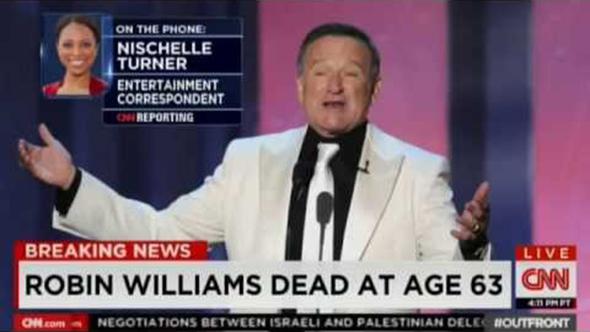It is jarring when a beloved celebrity dies of something you could possibly die of yourself—when all of a sudden people are talking about the illness you have, the one that they usually don’t want to talk about at all. The experience you live with every day is, in an instant, “breaking news,” and the mental health talking heads you haven’t seen since the last tragedy come marching back on to CNN.
I struggle with depression, and I am very sad about Robin Williams. Not because of that scene from Good Will Hunting, but because he was yet another person who couldn’t live anymore with this disease I am living with.
There were a lot of comments on Twitter about how much Robin Williams was loved and what a shame that he didn’t know it. I didn’t know Robin Williams, but I bet he did know that he was loved. I know that I am loved. Maybe not on a Robin Williams scale, but I have friends and family who would do anything for me, and I absolutely know this. But there comes a point where love does not matter. When things are bad, I don’t care that people love me. All I can see is that I’m a burden, that everything I have ever done is wrong, and that these good people who love me are wrong as well. At my lowest, love cannot save me. Hope, prayers, daily affirmations—none of these can save me. Therapy and medicine are what matter, and those don’t always work either.
So many people have commented on how all the money and fame in the world couldn’t save Williams from depression. Not being famous, I wouldn’t know, though I can’t even imagine how celebrity complicates a mental illness. The mentally ill must wage a fairly constant internal battle. It’s exhausting, even without the public spotlight. And the more tired you get, the more suicide can seem like the answer to everything, the answer that will stop all of the questions.
I have heard all the clichés and platitudes: What you need is to get out of your own head. Focus on the good things in your life. Look how many people care about you. Depressives spend a lot of time patiently explaining depression to people, and this can get pretty depressing in itself.
Mental illness isn’t a marketable disease. I’m sure there are many celebrities who suffer from it, but we don’t have a celebrity spokesperson. There are no ice bucket challenges for depression. Cancer survivors can proudly show off their scars, but no one wants to see ours. We don’t have a ribbon or color. Anyone want to buy a gray KitchenAid mixer for mental health research? And depression is one of the more acceptable mental illnesses to have. Imagine a 5k run for bipolar and borderline personality disorders.
It’s a tragedy that we don’t understand enough about mental illness to have been able to help Williams. Not because we liked Mrs. Doubtfire or Mork and Mindy, but because he was a human being, and because every single person lost to this disease is a tragedy: the people who leap off the Brooklyn Bridge, the schizophrenic man who delayed my train last month when he kept jumping down onto the tracks despite numerous attempts to remove him, every “crazy” homeless person you cross the street to avoid.
Mental illness is an indiscriminate killer, one that I have been outrunning for years. So many of us are, and not all of us survive, and a tragedy like this reminds you how real the danger is. One problem is, it’s easy for most people to go back to forgetting.
